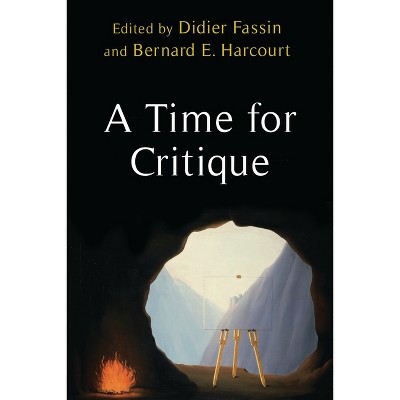Sponsored

Against Prediction - by Bernard E Harcourt (Paperback)
In Stock
Sponsored
About this item
Highlights
- From random security checks at airports to the use of risk assessment in sentencing, actuarial methods are being used more than ever to determine whom law enforcement officials target and punish.
- About the Author: Bernard E. Harcourt is professor of law and director of the Center for Studies in Criminal Justice at the University of Chicago.
- 264 Pages
- Social Science, Criminology
Description
Book Synopsis
From random security checks at airports to the use of risk assessment in sentencing, actuarial methods are being used more than ever to determine whom law enforcement officials target and punish. And with the exception of racial profiling on our highways and streets, most people favor these methods because they believe they're a more cost-effective way to fight crime.
In Against Prediction, Bernard E. Harcourt challenges this growing reliance on actuarial methods. These prediction tools, he demonstrates, may in fact increase the overall amount of crime in society, depending on the relative responsiveness of the profiled populations to heightened security. They may also aggravate the difficulties that minorities already have obtaining work, education, and a better quality of life-thus perpetuating the pattern of criminal behavior. Ultimately, Harcourt shows how the perceived success of actuarial methods has begun to distort our very conception of just punishment and to obscure alternate visions of social order. In place of the actuarial, he proposes instead a turn to randomization in punishment and policing. The presumption, Harcourt concludes, should be against prediction.From the Back Cover
From routine security checks at airports to the use of risk assessment in sentencing, actuarial methods are being employed more than ever to determine whom law enforcement officials target and punish. And with the exception of racial profiling on our highways and streets, most people favor these methods because they believe they're a more cost-effective way to fight crime.
In Against Prediction, Bernard E. Harcourt challenges this growing reliance on actuarial methods. These prediction tools, he demonstrates, may in fact increase the overall amount of crime in society, depending on the relative responsiveness of the profiled populations to heightened security. They may also aggravate the difficulties that profiled persons already have obtaining work, education, and a better quality of life--thus perpetuating the pattern of criminal behavior. Ultimately, Harcourt shows how the perceived success of actuarial methods has begun to distort our very conception of just punishment and to obscure alternative visions of social order. In place of the actuarial, he proposes instead a turn to randomization in punishment and policing. The presumption, Harcourt concludes, should be against prediction.
Review Quotes
"Bernard Harcourt has never had an uninteresting thought, or made an argument that does not provoke or engage or delight or enlighten--or do all of those things simultaneously."
--Malcolm Gladwell (8/28/2006 12:00:00 AM)"In Against Prediction, Bernard Harcourt stresses that while the benefits of actuarial predictions have been widely touted, certain costs have been largely overlooked. Indeed, actuarial prediction can under some circumstances actually increase crime, and generate morally problematic social wounds on the profiled classes that might outweigh the benefits even if crime is reduced. Once again, Harcourt has challenged the conventional wisdom in criminal justice policy, and offered an indictment to the practice of actuarial prediction that policymakers, scholars and concerned citizens will have to fully consider."
--John J. Donohue III, Leighton Homer Surbeck Professor of Law, Yale Law School (8/28/2006 12:00:00 AM)"This is a creative, provocative, well-researched argument against current practice in sentencing, parole discrimination, and investigative profiling. Harcourt makes the case that a century of social science-inspired thinking about punishment and profiling should be cast out in favor of randomness. It is a position that will be dismissed by many as politically impractical, if not absurd. But that is often the immediate fate of revolutionary ideas."
--Jack Katz, University of California, Los Angeles (8/28/2006 12:00:00 AM)"Against Prediction convincingly argues that the use of economic actuarial methods--predicting individual criminal likelihood based on the quantifiable characteristics of groups to which one belongs--is fundamentally flawed. . . . That we fail to see the harms of prediction, and that we proudly aspire to some quixotic goal of corrective 'efficiency' is to our collective shame as much as Against Prediction is to Harcourt's credit."--Peter Moskos "American Journal of Sociology"
"Against Prediction is inspiring in its breadth of erudition, from mathematics to philosophy, sociology, and history, and persuasive in its impassioned and provocative argument. . . . If we want to break the hold that racialist thinking has on criminal law, there is no better place to begin than the apparently neutral actuarialism of the new penology."--Ariela Gross "Law & Social Inquiry"
"[Harcourt] has produced a book of such exceptional quality that this reviewer can only describe his offering as not only a welcome breath of fresh air on profiling, but urgent, required reading for all students of criminology, criminal justice, and, of course, profiling in all its forms. . . . This is scholarly analysis of the bases of actuarial criminal profiling at its very best and is an outstanding book. A new benchmark in the field."--John Horgan "Review of Policy Research"
"[These] arguments should be studied by anyone who is considering advocating, or utilizing, formal predictive methods in the domain of law enforcement."--David Canter "Howard Journal"
"As debate on profiling and terrorism grows sharper. . . . Harcourt's book will remain essential reading for those who wish to look past the chestnuts of stale debate on crime and policing, and to see with fresh eyes the problems of the criminal law."--Aziz Huq "New York Law Journal" (5/25/2007 12:00:00 AM)
"Harcourt welds normative and analytic arguments about risks and actuarial approaches to policing and criminal justice in a novel and readable fashion. This deserves a wide hearing among scholars and students interested in risk, actuaruarial logic and new modes of governance through crime control."--Kevin Stenson "Surveillance and Society"
"Those whose focus is on behavioral and attitudinal studies should read this book. Why? It is counterintuitive. It offers challenging assumptions. It raises questions about social discrimination."--David S. Mann "Law and Politics Book Review"
About the Author
Bernard E. Harcourt is professor of law and director of the Center for Studies in Criminal Justice at the University of Chicago. He is the author of Illusion of Order: The False Promise of Broken Windows Policing and Language of the Gun: Youth, Crime, and Public Policy.
Shipping details
Return details
Frequently bought together
Trending Non-Fiction


















